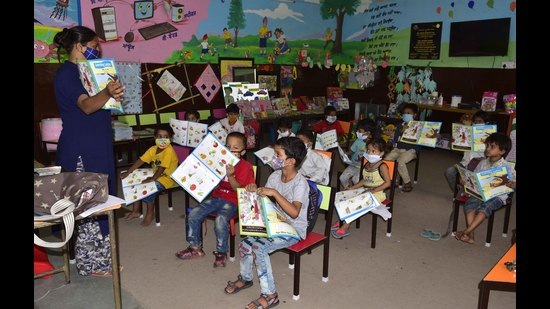The NEP child: Future learners of India
The NEP child will not be a harphanmaula (jack of all trades). Instead, what we will see are sets of diverse children with a common set of values for excellence, nation-building, environment-friendliness and humanism, who are knowledge creators even after leaving schools. They will be lifelong learners, for their schooling has no finish line.
Hello from the future. We are engaging with you from a future that is anywhere between 10 years (2031) to about 20 years (2040) from the present. The trailblazing National Education Policy (NEP) was released in 2020. The core principles of education were iterated in the policy — recognising, identifying, and fostering the unique capabilities of each learner, with no hard distinctions between humanities, sciences, vocational learning, sports, and arts to remove dissociation among different areas of learning.

The policy made it clear that the most essential skills for the future are critical thinking, creativity, communication, and collaboration. That is what led to this day, when the NEP child became a community builder — more an employment provider, and less an employment seeker.
In this future, textbooks have lost the battle of being the fountainhead of all information. Content is presented in different ways, through different means and modes. Creativity is the king of content now. Teachers are professionally trained and tech-savvy; schools and pedagogies are innovative and joyful; parents are well-informed; subjects have lost boundaries; assessment is continuous; values, technology, skilling, sports, arts, languages, and knowledge of India are integrated at every stage. Peer learning has reached a higher level.
Children in the fourth decade of the 21st century are complete, for they have fully imbibed humility, empathy, tolerance, human rights, gender equality, non-violence, global citizenship, inclusion, and equity. They understand that pride in the nation is the cornerstone of being a global citizen. They respect the environment and constantly make efforts to conserve it — at home, school, and their lives outside these places.
The Covid-19 pandemic that struck the world in 2020 was a major disruptor for the education ecosystem, and that experience radically shaped the approach to education and the mindset regarding curriculum and its delivery. A child of the 2030s is a tech-friendly one, who knows that technology-based content alone cannot help achieve the desired learning outcomes.
This child uses technology to further curiosity and learn of areas that may not be a part of the curriculum, to acquire skills in cutting-edge areas of learning — coding, Artificial Intelligence, organic farming, biophysics, among others. Since the curriculum content has been reduced in every subject to its core essentials, the child has ample space and time for observation, reflection, critical thinking and inquiry-based, discovery-based, discussion-based, and analysis-based learning.
The NEP child has no exam fear or stress, but is holistically and continuously assessed based on curiosity and ability to learn. Now, there is space to thrive even for so-called “troublemakers” who see things differently. Their creativity is nourished and cultivated. Children with talent in any area — art, sport, technology, science, mathematics, languages — are being nurtured as the ability-dividend of the nation. Every child can think mathematically, and with a scientific temper. Every child can communicate, read and write in at least two Indian languages. Every child has a healthy relationship with physical fitness and nutrition. Author Isaac Asimov’s words, “The saddest aspect of life right now is that science gathers knowledge faster than society gathers wisdom”, are no longer true. Yes, school-going children are now patenting new creations in the hundreds and thousands.
All this seems right, but the dichotomy is that it may be a bit too much for existing institutions to fathom. Well, from the future, we assure you that many things will change, transform, innovate, adapt and adopt to create the NEP child. The NEP child will not be a harphanmaula (jack of all trades). Instead, what we will see are sets of diverse children with a common set of values for excellence, nation-building, environment-friendliness and humanism, who are knowledge creators even after leaving schools. They will be lifelong learners, for their schooling has no finish line.
Anita Karwal is secretary and Rajnish Kumar, director, department of school education, Government of India
The views expressed are personal
All Access.
One Subscription.
Get 360° coverage—from daily headlines
to 100 year archives.



HT App & Website






